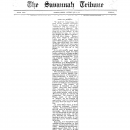Main menu
- ‘Abdu’l-Bahá’s Journey
- World Peace
- Stopping Racism in America
- Empowerment of Women
- More Principles...
- Prayer for America
A Persian Teacher
On April 12 ‘Abdu’l-Bahá, the head of the religious movement known as Bahá’ísm, arrived in America to visit his rapidly increasing band of followers. His coming is of particular interest to those of us who believe in the brotherhood of man, for that is the doctrine the Bahá’ís emphasize above all other things. Because they have taught it, their first leader was put to death, their second died in prison, while ‘Abdu’l-Bahá, their third head, has spent all his life, until a few years ago, in the Turkish prison at Acca, in Syria, the “new holy city” of the Bahá’ís.
It is only seventy years since the movement of which he is the leader originated in Persia; to-day it numbers 10,000 disciples and is growing at an amazing rate. It is not, properly speaking, a “new religion.” It does not ask a Christian to cease professing Christianity or a Mohammedan to give up his Mohammedanism. It does, however, demand that each person shall follow the spiritual truths of his religion, and it pays little attention to dogma.
The movement presents in many respects a striking parallel with the early growth of Christianity. Like Christianity, it began as a protest against the corruption of established, untolerant, unspiritual religion, and also like Christianity, it drew on itself the most inhuman persecutions. The number of martyrs is estimated at about 50,000. They have been burned alive, beheaded, torn in pieces, hanged and tortured in all the ways official cruelty could devise. There has not been an instance of recantation. The records of the Bahá’ís speak of the victims as “athirst” for the draught of martyrdom, and it is indeed true that they died with songs on their lips.
At ‘Abdu’l-Bahá’s house in Acca all men are welcomed: Persian, African, Frenchman, American — they all meet as brothers before the master. He is the most generous and hospitable of men and all are welcome to his table. He follows literally the scriptural injunction to give his goods to the poor; the coat he wears is usually all he has.
Naturally, he is interested in the question of race prejudice in this country, where he has so many disciples. Recently he sent this message to one of them, Mrs. M. L. Botay, who has sent it to The Crisis.
“Give Mrs. Botay my greetings and love and tell her she must greatly endeavor through the assistance of heaven to cast light among the colored people, so that they may become as our brothers, no blacks, no whites, both as one. By this means you shall free America from all prejudice. Because in the Kingdom of God all are the same, whether black or white. The greater the faith of either, the more acceptable is he in the Kingdom. A faithful colored believer is a child of the Kingdom, while a white unbeliever is deprived. God looks upon hearts, not upon colors. He looks time of trial was in the years 1884 to 1892 upon qualities, not upon bodies”
— The Crisis.



.png)





